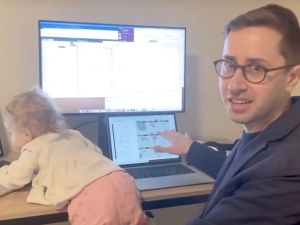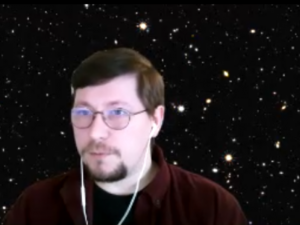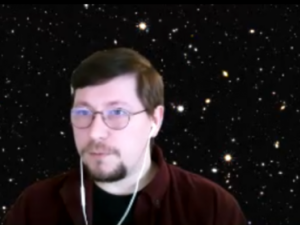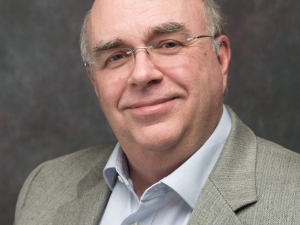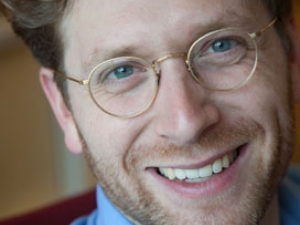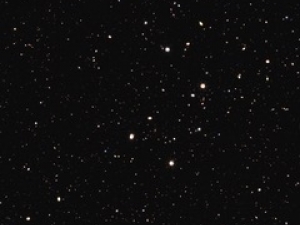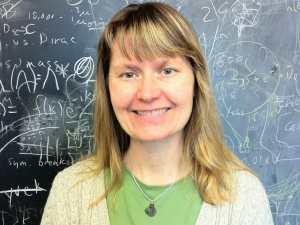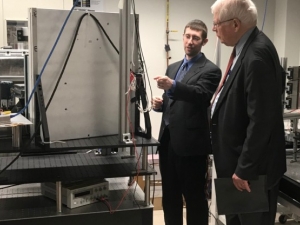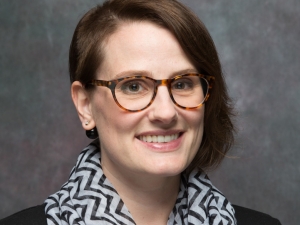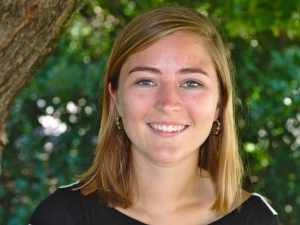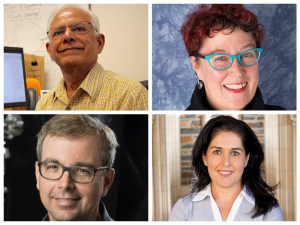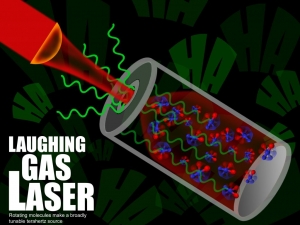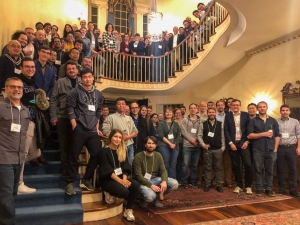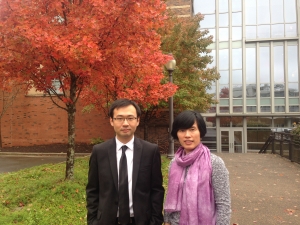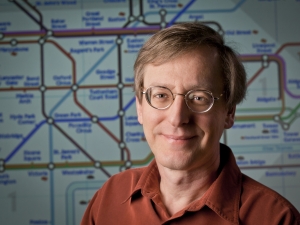Duke University has awarded distinguished professorships to 29 faculty members from eight Duke colleges and schools. While the annual University Distinguished Professors dinner will be postponed until social gathering restrictions are lifted, Provost Sally Kornbluth is ready to congratulate this year’s recipients now. “I am thrilled to honor this wonderful cohort of scholars, teachers, and members of the Duke community,” Kornbluth said. “Becoming a distinguished professor at Duke is a great achievement, and one that is… read more about Duke Awards 29 University Distinguished Professorships »
Prof. Daniel Scolnic (and his daughter, marking her video debut movie experience) and Prof. Patrick Charbonneau have been included in a video Duke made about how scientists are dealing with working from home during the COVID-19 pandemic. Read more about "Data at a Distance" on DukeToday's website here. read more about Professors Share Their Experiences Working from a Safe Distance »
Keep Teaching is sharing stories of how Duke faculty are implementing remote learning. Here, Michael A. Troxel, Assistant Professor of Physics, details his experience. My approach was to try to keep the class experience as consistent as possible. I have a lot of experience working on Zoom meetings in my research collaborations, so it wasn’t much of a change for my daily work mode. I got an iPad so I can easily share it as a virtual whiteboard on Zoom, so the students are watching me write out derivations and… read more about Recreating a Physics Classroom on Zoom »
In part of Duke's Keep Teaching initiative, Prof. Michael Troxel shared his experience teaching physics remotely with Zoom during the COVID-19 pandemic. Maintaining a fresh and interesting atmosphere has been a challenge for professors university-wide. Click here to read some of Troxel's tips. read more about Prof. Troxel Shares his Tips for Teaching from Home During COVID-19 »
Prof. Warren Warren, who holds appointments in Physics, Chemistry and Radiology, has been awarded the 2020 Günther Laukien Prize for his contributions to nuclear magnetic resonance spectroscopy (NMR) and its cousin, magnetic resonance imaging (MRI). MRI, which uses magnetic fields and radio waves to measure signals from spinning protons, has been used in medicine since the 1980s as a noninvasive way to create pictures of the inside of the body without using radiation like X-ray or CT scans do. One of… read more about Prof. Warren Wins Award for Magnetic Resonance »
Prof. Patrick Charbonneau, Associate Professor of Chemistry and Physics, is trying to crack the glass problem as part of an international Simons Collaboration. In a new video from Duke's Why Do You Study That? series, he explains what is the problem with glasses and cracks some along the way. read more about Prof. Charbonneau Tries to Crack the Glass Problem »
Research could help pave the way to more versatile, low-cost MRI for studying metabolic reactions in real-time Duke professor Warren Warren has been awarded the 2020 Günther Laukien Prize for his contributions to nuclear magnetic resonance spectroscopy (NMR) and its cousin, magnetic resonance imaging (MRI). MRI, which uses magnetic fields and radio waves to measure signals from spinning protons, has been used in medicine since the 1980s as a noninvasive way to create pictures of the inside of the… read more about Duke Professor Warren Warren Wins Award for Magnetic Resonance »
Profs. Daniel Scolnic and Michael Troxel are science leaders for WFIRST, a next generation NASA flagship mission. WFIRST passed its agency-level review by the NASA Agency Program Management Council under what is called Key Decision Point C, which allows the mission to formally enter a development phase and begin construction of engineering and test components for the mission. The WFIRST telescope is expected to be launched in 2025 and will enable the most precise measurements of dark energy… read more about NASA Science Mission WFIRST, with Science Led by Prof. Scolnic and Troxel, Passes Key Milestone, Launch to be 2025 »
Prof. Kate Scholberg has been named an outstanding referee by the editors of the Physical Review journals. Scholberg is one of 147 Outstanding Referees for 2020 selected by the American Physical Society (APS) that have demonstrated exceptional work in the assessment of manuscripts published in the Physical Review journals. A full list of the Outstanding Referees is available online here. Instituted in 2008, the Outstanding Referee program annually recognizes… read more about Prof. Scholberg Announced as APS Outstanding Referee for 2020 »
Alum Joel Greenberg (PhD '12, advisor: Gauthier), now research professor of Electrical and Computer Engineering, is involved in research to improve airport screening with x-ray diffraction. The team, which also includes Physics secondary Prof. Anuj Kapadia, primarily appointed in Radiology, demonstrated their technologies for U.S. Representative David Price last week. Read about more about "A Speedier and More… read more about Alum Greenberg and Prof. Kapadia Improve Airport Screening »
The positive decision by the Department of Energy for the construction of the EIC is a great step forward for the field of nuclear physics. This new facility will give unprecedented insight into the dynamics that are responsible for much of the properties of the visible mass. It will provide much deeper insight into the building blocks of matter than ever before with the potential for transformative discoveries. Researchers at Duke, in particular Professors Haiyan Gao, Berndt Mueller… read more about The Electron-Ion-Collider to be built at Brookhaven National Lab – Duke Faculty helped pave the way! »
The “Snowmass” study organized by the American Physical Society Division of Particles and Fields (DPF) is the long-term planning exercise of the U.S. High Energy Physics (HEP) Community, which takes place approximately once a decade. From the DPF newsletter (link: https://www.aps.org/units/dpf/newsletters/upload/January-2020-Newsletter.pdf) "Snowmass is an opportunity for the entire HEP community to come together to identify and document a vision for the future of particle physics in the U.S. and with its… read more about Profs. Barbeau and Scholberg Selected as “Snowmass” Frontier Conveners »
Several members of the cosmology group made their way this month to the LSST Dark Energy Science Collaboration meeting in Arizona. Here you see some of our faculty, postdocs, grad students and alumni including three former Duke physics undergraduates who are now in graduate school and working with us as colleagues. read more about Cosomology Group Members Attend LSST Meeting »
In other exciting news from our Cosmology Group: The LSST has been renamed as the Vera Rubin Observatory. The observatory is named after an astronomer who provided important evidence of the existence of dark matter, and is the first national US observatory to be named after a woman. Read more on LSST's website here.Photo credit: NOAO/AURA/NSF read more about LSST Renamed Vera Rubin Observatory »
Prof. Kate Scholberg will participate in the Science & Society Dinner Dialogues series on Wednesday, February 5. Click here to read a little more about her upcoming discussion about neutrinos. The Dinner Dialogues series is intended for a wide audience in an informal setting but there is a waitlist. You can sign up on the event page. read more about Prof. Scholberg to Participate in S&S Dinner Dialogue »
Graduate student Shobhit Sharma and his advisors Profs. Ehsan Samei and Anuj Kapadia report that accurate individualized estimates of organ doses in computed tomography (CT) can now be performed within clinically acceptable computation times. They utilized an automatic image-segmentation method to create custom anatomical models from patients’ CT data along with a parallelized Monte Carlo simulation of photon transport to compute the radiation burden imposed by a CT… read more about Graduate Student Makes Progress in Medical Imaging »
Assistant to the Chair Cristin Ryman has successfully completed the Certified Payroll Representative program. The certification is one of many offered by Duke University Financial Services that included over ten classroom courses with accompanying quizzes and a final exam. From Timothy W. Walsh, Vice President for Finance: "Cristin has demonstrated expert knowledge of the systems and resources vital to understanding and using Duke University payroll processes. The final exam is a… read more about Staff Member Ryman Completes Payroll Representative Certification »
Graduate student Emily Phillips Longley is at the SLAC National Accelerator Laboratory in California working with a team to build a camera that will be housed at the Large Synoptic Survey Telescope (LSST) presently under construction in Chile. The camera that will spend ten years mapping the sky above the Southern Hemisphere. Click over to the Graduate School's website to see photos and read more about Longley's exciting DOE-funded research: "Physics Ph.D.… read more about Grad Student Longley Helping to Build the World's Largest Digital Camera »
Thanks to a grant from the Department of Energy, physics Ph.D. student Emily Phillips Longley is spending six months at the SLAC National Accelerator Laboratory in California, helping to build a camera. A camera the size of a car. Longley is part of a team building the Large Synoptic Survey Telescope (LSST), a facility in Chile that will boast the world’s largest digital camera and use it to conduct a 10-year survey of the sky over the Southern Hemisphere. The 3,200-megapixel camera will observe the entire southern sky… read more about Physics Ph.D. Student Helping to Build World’s Largest Digital Camera »
Higher education institutions like Duke are gateways to opportunity and success for many low-income and first-generation college students. They are also home to professors who once stood in those students’ shoes and used their education to get into academia. Here are some professors from Duke who were low-income, first-generation (LIFE) college students. Jen’nan Read: Sally Dalton Robinson professor of sociology, chair of the department of sociology Jen’nan Read was born in the United States and moved to… read more about Professors from low-income first-generation backgrounds are ready to help Duke students »
The Southeastern Section of the American Physics Society (SESAPS) has just selected TUNL Director Prof. Art Champagne and Prof. Christian Iliadis (UNC Chapel Hill) to jointly receive the 2019 Jesse W. Beams prize for outstanding research conducted in the Southeast. Champagne and Iliadis were selected to receive this prize in recognition of “their research leadership in experimental nuclear astrophysics, especially for the conception and development of their measurement program of thermonuclear reaction… read more about TUNL Director Prof. Champagne Shares 2019 Beams Prize with Iliadis »
Adjunct Prof. Henry Everitt has just had an article published in Science magazine on a new kind of laser he has been working on for the last few years with colleagues at Harvard and MIT. This news was featured on the Duke Research Blog. Read "Scientists Made a 'T-Ray' Laser That Runs on Laughing Gas" here. Press releases were also shared by MIT, Harvard, and the Army. Photo courtesy of Chad Scales, US Army Futures Command read more about Prof. Everitt and Colleagues Run Laser on Laughing Gas »
"The Magnificent CEvNS", a workshop focused on theoretical and experimental aspects of coherent elastic neutrino-nucleus scattering, was held in Chapel Hill on November 9-11, 2019. The workshop organization was led by Prof. Phil Barbeau’s former student, Grayson Rich, and local organizers included Phil Barbeau and Prof. Kate Scholberg. Duke graduate students Sam Hedges, Long Li, and Adryanna Smith… read more about Magnificent CEvNS Workshop in Chapel Hill »
The proton, that little positively-charged nugget inside an atom, is fractions of a quadrillionth of a meter smaller than anyone thought, according to new research appearing Nov. 7 in Nature. Haiyan Gao of Duke Physics In work they hope solves the contentious “proton radius puzzle” that has been roiling some corners of physics in the last decade, a team of scientists including Duke physicist Haiyan Gao have addressed the question of the proton’s radius in a new way and discovered that it is 0.831 femtometers across, which… read more about How Small is a Proton? Smaller Than Anyone Thought »
Duke Physics graduate student Weizhi Xiong in Prof. Haiyan Gao’s group is the lead author of a paper on "A small proton charge radius from an electron–proton scattering experiment" which appeared in Nature (online) on November 6, 2019 at 18:00 (London time), November 6, 2019 at 13:00 (US Eastern Time). This is a major result in resolving the proton charge radius puzzle that started in 2010 and refers to the large discrepancy between the ultra-high… read more about Gao's Group Published in Nature on a Major Result After Nearly Ten Years of Research »
The National Science Foundation is funding the new Center for Synthesizing Quantum Coherence (CSQC) as a Phase I Center for Chemical Innovation. Led by Duke, and featuring distinguished chemists at Northwestern University, University of California – Berkeley, and University of Illinois Urbana-Champaign, the Center aims to unmask the coherent quantum mechanical flow of electronic excited states and of charges, along with their coherent spin-spin interactions, in precisely tailored nanostructures and… read more about Prof. Beratan to Direct NSF's Center for Synthesizing Quantum Coherence »
If you ask Duke assistant professor Dan Scolnic what amazes him about cosmology, he’ll say, it’s “really the only field in all of science where you could stand in front of people and say, ‘we understand 5% of what’s going on,’ and still think we’re kind of smart.” That’s because all the stars, planets and galaxies that scientists see today make up just 5% of the universe. The other 95% is made of mysterious stuff called dark matter and dark energy that scientists can’t see or detect directly. Scolnic says scientists may be… read more about Prestigious Packard Fellowship Supports Duke Cosmologist in Answering Questions About What Makes Up the Universe »
The Physics Department is delighted to report that Prof. Daniel Scolnic has been selected by the David & Lucile Packard Foundation as a 2019 Packard Fellow. Congratulations on this outstanding honor! See the official announcement from the Packard Foundation here and DukeToday's article here. read more about Prof. Scolnic Receives Packard Fellowship »
Graduate student Yiqiu Zhao and colleagues have been featured in an APS Viewpoint. Zhao summarizes: Granular matter can behave like solid or liquid. A phase diagram that predicts the behavior of granular matter based on control parameters is important but not well established. Part of the difficulty is, granular matter develops spatial heterogeneity known as shear band under shear, making it hard to build connections between state variables since a well-defined “state” should be homogeneous.… read more about Grad Student Zhao and Colleagues in APS Viewpoint »
The 2019-2020 Department of Physics graduate student fellowships were awarded to: Richardson Fellowship: Aitor Bracho Rebecca Chen Austin Hulse Shiv Yadavalli AAPT Outstanding Teaching Award: Benjamin Hamm (nominated by Lecturer Arya Roy) Derek Soeder (nominated by Prof. Joshua Socolar) Mary Creason Award: Ethan Mancil (advisor: Prof. Gleb… read more about 2019-2020 Graduate Student Fellowships »

